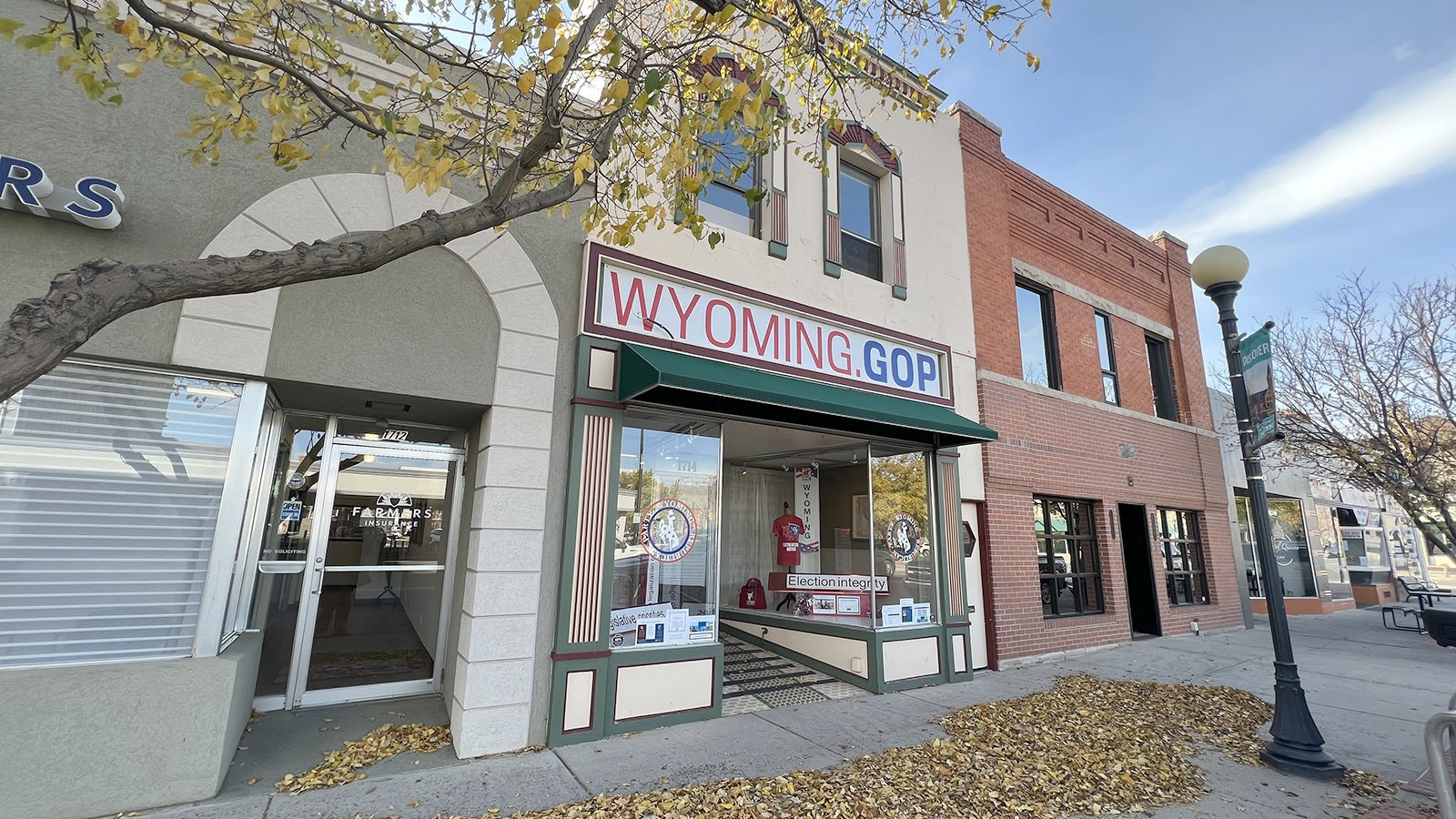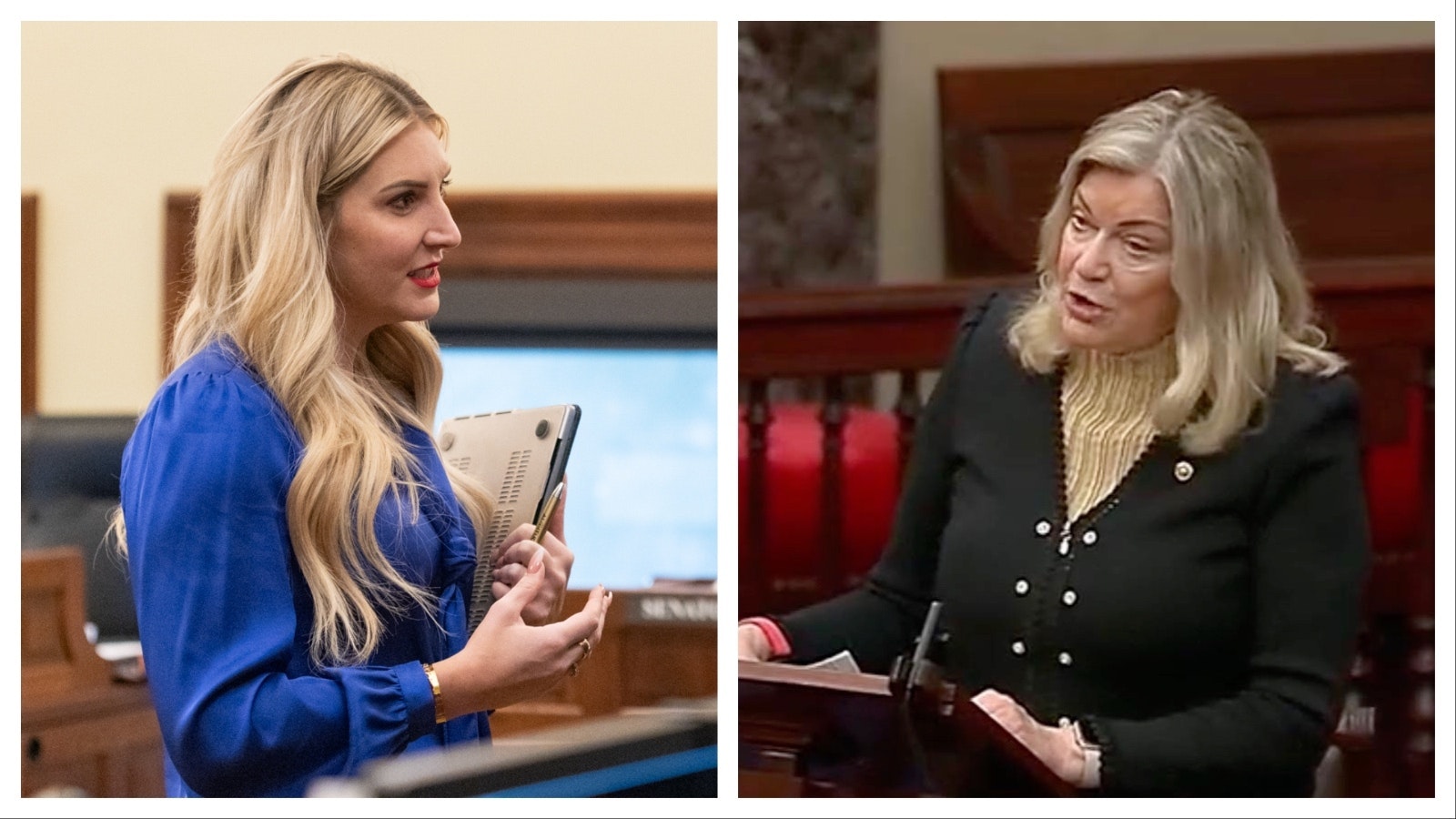The Wyoming Republican Party has been taking steps to assert its position as a private, not public, organization.
This weekend, the party may continue that effort when considering at its biennial state convention in Cheyenne proposed bylaws submitted by the Weston County Republican Party that would allow the state party expansive powers to kick out members and county parties the right to kick out their entire leadership teams as they see fit.
One of the overarching inspirations behind the bylaws is for the state GOP to have the power to remove members deemed as not adhering to the party’s platform, and thus illegitimate Republicans in their eyes. This has been a frequently expressed frustration in recent years in Wyoming GOP circles.
“A lot of people come into the party and they’re not really Republicans,” Wyoming GOP National Committeewoman Nina Webber said. “They don’t believe in the Republican platform and they’re not guided by what we use to govern as a party.”
The party’s platform is determined by the delegates its central committee members select for county and state conventions.
State Sen. Cale Case, R-Lander, has been frequently accused of not being a “real” Republican by some party members, and the party censured him in 2022. He said the proposed bylaws undermine the constitutional right to vote.
“Some aspects of democracy are pretty important,” Case told Cowboy State Daily.
Some of those Republicans targeted by the party like Gov. Mark Gordon won their most recent elections by landslide margins.
Webber believes those results can be at least partially attributed to Democrats and Libertarians registering as Republicans to vote in primary elections.
“It makes it more important than ever to show the differences,” she said.
Some, like Webber, have complained about the diminished power of the Democratic Party in Wyoming, which she believes if stronger would make it less likely for people to want to affiliate as Republicans who don’t align with the party’s platform.
“If they believe in (that) party’s values, they should support that,” she said.
Who’s First?
If the bylaws pass, one of the first county parties likely to be targeted for executive committee removal is the Natrona County Republican Party, which has not paid any dues to the state GOP since 2019. In Natrona, this could open the door for the Liberty’s Place 4 U group to take over party leadership. It’s an organization that has popped up in Casper to counter the current leaders of the Natrona County GOP.
There is frustration in some counties like Natrona that the executive committee is dominating the party’s decisions by not convening central committee meetings.
Removing a county party’s executive committee could be done with a two-thirds vote of its central committee members party, as could the creation of a new executive committee. This power already exists on a county level for individuals.
“These are abuses, these are not free and fair elections,” Case said of the impacts if the changes go through. “They want to control access.”
The first change proposed in the bylaws is to remove all mention of the word “membership” and replace it with “affiliation.” This would be done for the purpose of establishing whether someone gets to participate in Republican Party is at the pleasure of the party, not the individual.
“All Wyoming residents are welcome to register or affiliate with the Republican Party in the state of Wyoming, but only subject to the constitutional right of the party to exclude persons from the party,” the bylaws read.
In a 2000 U.S. Supreme Court case, the court ruled that political parties have the right to private association and exclude membership.
What Does It All Mean?
The bylaws state that people “who have been excluded from the Wyoming Republican Party by the Wyoming Republican State Central Committee, as set forth herein, shall no longer be affiliated with the Wyoming Republican Party,” the proposed bylaw reads.
People kicked out of the party could be banned for up to 10 years “from exercising the privileges of being a Republican in the state of Wyoming.”
The last section is fraught with complications as Republican Party primary elections are open for the public to participate in Wyoming, as long as someone registers as a Republican. The party would have no power to remove or prevent Republican state legislators, county commissioners and statewide officials from serving in office, but it could refuse to recognize those people, and make life difficult for precinct committee members.
Those people are publicly elected in the state’s primary elections, but only conduct their duties in party meetings and make no public decisions, aside from the filling of political vacancies.
“I love how they want to be private but have a very public purpose as far as providing people in primary elections,” Case said. “They’re trying to play kingmaker in very narrowly construed leadership.”
The bylaws state that only Wyoming residents registered or affiliated as Republicans that have not been excluded from the party may attend county GOP precinct caucuses, participate in county or state GOP conventions, run to be precinct members, and serve on any precinct, county, state, national or any other committees within the Wyoming Republican Party, run for party office or “hold himself/herself out to the public as a Republican in any way, or run for public office.”
This would give the party the power to kick out precinct committee members who were elected through publicly held primary elections. The party still has no power at this time to remove other people elected through the primary election, other than making a formal statement against them.
Precinct members could be removed with a simple majority vote of the state party’s central committee members.
What It Takes To Remove
The bylaws establish an “Affiliation Committee” that submits recommendations on who should be removed from the party. This committee will consist of at least 25 party members appointed by State Republican Party Chairman Frank Eathorne and approved by the majority of the party. This group must meet no less than once a month.
This group will be charged with investigating allegations made about party members.
Offenses that can get people kicked out of the state Republican Party include:
- A Wyoming resident currently registered or affiliated with the party who has changed party affiliation at least once since Jan. 1, 2018, and was registered with another party or unaffiliated for five years prior to the change.
- A Wyoming resident registered with the party who has changed party affiliation at least twice since Jan. 1, 2004.
- A state legislator currently registered as a Republican who has sponsored or co-sponsored a bill to oppose any Wyoming Republican Party platform plank.
- A Wyoming resident registered as a Republican who has donated money or anything of value in the last 10 years to a campaign of a political candidate who is not affiliated or registered as a Republican, or political action committee that supports or funds candidates not affiliated or registered as Republicans.
- A Wyoming resident who cannot prove U.S. citizenship.
- Any person representing Wyoming in Congress “who has engaged in sham congressional committees with the Democrats and fed dishonest or libelous information to the mainstream press alone or alongside radical liberal Democrats in an effort to defeat Republican candidates and spread the Democrat’s fraudulent narratives.”
Those being considered for removal can be heard before the Affiliation Committee, where they can argue in a “nontrial-type hearing” whether they support at least 80% of the party’s platform and should not be removed.
Those who have been removed and want to re-register Republican or change affiliation to Republican must get approval from the Affiliation Committee, which is likely illegal considering people register to vote under political parties with county agencies, not the parties themselves.
Private Vs. Public
The crux of these bylaws come back to the ongoing debate about whether political parties are private entities in Wyoming.
Case believes the party wants to have its cake and eat it too when considering its primary elections are fully public and run and paid for by the state. If the party wants to be considered private, he said it needs to get away from public elections.
“They want to decide who’s on the ballot in the primary, who gets to run,” Case said. “It’s approaching a dictatorship.”
There’s recent legal standing on the matter established in a 2023 ruling by the Wyoming Supreme Court against the Uinta County Republican Party, which said the Republican Party does need to follow state election laws.
Case believes that if the new bylaws pass, they’ll draw a lawsuit.
“It will have to be,” he said. “I’ve never seen anything like this happen before.”
Webber, who attends Republican National Committee meetings throughout the year, said she’s heard of similar proposals brought up in party meetings in other states, but she’s unsure if any have passed.
She admitted that the proposed bylaws could be potentially weaponized over personal conflicts and petty disputes, but reasserted that the bylaws and following actions would have to be approved through a vote of party members.
“They come down and represent their party’s beliefs the best way they know how,” she said.
The bylaws will be considered at the Wyoming GOP’s convention this weekend at Little America Resort in Cheyenne. If adopted, they will go into effect immediately.
Leo Wolfson can be reached at leo@cowboystatedaily.com.





